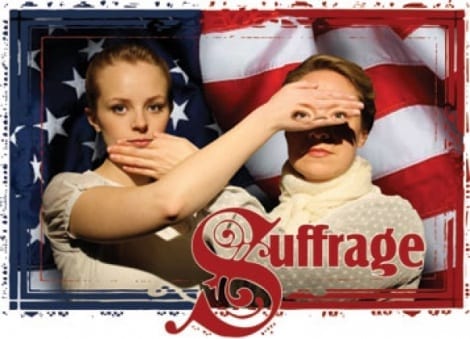SALT LAKE CITY — I’ll be honest; polygamy is not a topic I like to bring up in conversation. It is, however, crucially linked to the formation of our state, no matter how we may choose to gloss over it. With her new play Suffrage, Jenifer Nii has created a taut, engrossing, seminally female story that made me think long and hard on its thorny subject, and wish I had written it.

Set in 1880s territorial Utah, Suffrage is the story of Frances (April Fossen) and Ruth (Sarah Young) two plural wives in a household under siege by the federal government. Their husband Benjamin is in prison awaiting trial, and his five wives and numerous children must find ways to make ends meet. Frances is stalwart and traditional, loving her sister wives’ children as she does her own and thinking constantly of her dear husband and his welfare. Considerably younger, Ruth is a firecracker of high ideals and modern thought, getting deeply involved in Utah’s suffrage movement. One of the most effective choices playwright Nii makes here is to position Frances as a potential mother figure for Ruth.

The performances of these two ladies are fine and fascinating. Young’s Ruth is appropriately brash and naive, frustrating yet admirable in her passions. Fossen’s performance is a tour de force; her Frances is a mother and, to an extent, a martyr. Fossen’s performance is subtle and strong, much like Frances herself. If it makes any sense, I relate to Ruth, but I feel I should be a Frances.
Coming into this play as a LDS woman who can hardly grasp the idea—let alone the practice—of polygamy, I found in Frances and Ruth a bastion of belief; a bare, solid faith that make an unfamiliar family structure comprehensible. There is nothing odd or off-putting in Nii’s depiction of these women and their way of life. The play does not condemn or commend polygamy; it simply portrays it. Frances and Ruth work to feed themselves and their family; they struggle to raise and discipline their children; they defend and practice their faith. The two are the only visible characters in the play, and they refer to each other more by the title “sister” than by name. They are an unlikely pair that, despite their differences, is incredibly devoted to each other. More than anything, that is what the play is about: about a family unit surviving as best they know how, despite looming opposition.

I enjoyed this production very much, and there are a number of levels to that enjoyment. First and foremost is Jenifer Nii’s elegant dialogue, lean and lovely and carefully constructed. Her words are well chosen and never wasted, and they instantly transported me to the Utah of 1887. Part of that is also due to Phil Lowe‘s fine costumes—neat and cared for, though on the verge of fraying—and Randy Rasmussen‘s sparse scenic design. A dramatically frozen swirl of silver mesh far upstage gave the play a contemporary current and also a strong sense of movement, particularly when struck by Jesse Portillo‘s simple and warm lighting.

Director and sound designer Cheryl Ann Cluff does a wonderful job bringing all of the pieces of the production together into a cohesive and moving whole. Thankfully, there is no overblown concept to get in the way of the affecting story. Cluff’s direction is as simple and clear as the play itself, highlighting these absorbing characters rather than any agenda, and aptly applying Fossen and Young to the task of bringing these women to life.
I think that’s probably the highest praise I can give a piece that could, in less skilled hands, have been an exercise in bashing or preaching. Suffrage is about people. Days after seeing it, I still care about these sisters who are like—and yet unlike—me. I didn’t come away from the performance incensed; rather, I had a clearer understanding of a social practice I have looked at askance for so long. I felt for these women, for their trials and their victories. Plan-B’s current production of Suffrage is a gem. I highly recommend it. It’s the best play I have encountered touching on polygamy, and I’m grateful to have experienced it.
[box type=”shadow”]The Plan-B Theatre Company production of Suffrage plays in the Studio Theatre at the Rose Wagner Performing Arts Center (138 W. 300 S., Salt Lake City) Thursdays through Saturdays at 8 PM, Saturdays at 4 PM, and Sundays at 2 PM through April 14. Tickets are $20. For more information, visit www.planbtheatre.org.[/box]

